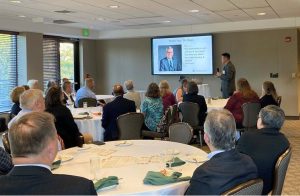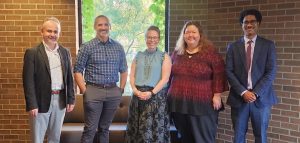On October 3, we hosted the Academic Leadership Fellows Fall Reception and Project Showcase. This event served as a welcome for our new cohort of Fellows for 2024-2025 and an opportunity for the 2023-2024 Fellows to share work they engaged with over the past year. As part of the ALF experience, each fellow is paired with a campus leader to gain first-hand exposure to academic administration. Fellows also receive mentorship as they work on a project that aligns their leadership interests with institutional priorities. The following provides a brief synopsis of the projects each of the 2023-2024 Fellows worked on this past year.

Project: SURVEY of MSU HUMAN HEALTH FACULTY ABOUT THE NEEDS FOR A BIOREPOSITORY INFRASTRUCTURE
Honglei Chen, Professor, Epidemiology and Biostatistics, College of Human Medicine
Mentored by Doug Gage, Vice President for Research and Innovation
Research studies utilizing resources from large biorepositories have seen significant growth. While health researchers have access to large open-access biobanks, MSU does not currently have a centralized infrastructure for biospecimen storage. With the recent partnership with Henry Ford Health System, increased MSU researchers in the biomedical and health areas, and multidisciplinary projects requiring the sharing of large data sets, Dr. Chen’s project focused on better understanding the needs for an internal biorepository infrastructure. The first step was meeting with leaders and faculty who engage in these areas. The information he gathered informed the development of a survey sent out to faculty from three health colleges. The survey findings showed a “modest but increasing need for biorepository support at MSU.” Dr. Chen envisions this data provides a starting point for more in-depth conversations with faculty around biospecimen needs and explorations into what is needed locally at MSU to continue to support and advance research in these areas.
Project: ARTIST-IN-RESIDENCE: ENHANCING MENTAL HEALTH, BELONGING, AND INCLUSION THROUGH ART
Bree Holtz, Associate Professor, Advertising and Public Relations, College of Communication Arts and Sciences
Mentored by Judith Stoddart, Vice Provost for University Arts and Collections
MSU is dedicated to infusing Art into all aspects of campus life which will lead “innovative practices of discovering, connecting, exploring, and remembering”. Dr. Holtz saw opportunity to connect the Arts Initiative with the newly reimagined University Health and Wellness unit that has a similar mission to see “health and wellbeing equitably woven throughout all aspects of Spartan life.” Working with leaders from both areas, Dr. Holtz’s project identified a way to bring arts and wellness together by developing an artist-in-residence model to create a mural in the renovated Olin Health Center. The goal for her project was “to create a vibrant community through collaborative art that promotes well-being and connection.” The artist-in-residence will work with student groups throughout the coming year, listening as they provide their perspectives and ideas for a mural that has potential to improve patient satisfaction, reduce anxiety and stress, and improve sense of belonging. The mural is anticipated to be finished in April 2025. At that time, students who participated in the mural production will have an opportunity to reflect on and discuss their experiences working with the artist and share their impressions of the collaboration
Project: CORPORATE (INDUSTRY) ADVISORY BOARDS FOR UNIT/DEPARTMENT LEVELS
Kari Kammel, Director, Center for Anti-Counterfeiting and Product Protection
Mentored by Eric Hegg, Dean, College of Natural Science
Connection to industry partners has become increasingly important to higher education, with implications for student success and job placement, research, and outreach. As part of the College of Natural Sciences (CNS) strategic plan, there was a drive to see increased collaboration with industry at the unit/department level. Developing industry advisory boards (IABs) has proved successful in other areas, but there is often “decentralized engagement at the unit level with industry, (which) can often be underdeveloped and not incentivized.” Ms. Kammel’s project was to develop a best practice guide to help units in CNS create and run IABs. Building on her own experiences with industry boards and information she gathered from leaders across MSU, Ms. Kammel’s guide outlines a five-step process for standing up an IAB and six areas to consider while running the board. While these principles were developed for CNS, other colleges and units can adapt this guide to help inform their own practices when working with IABs.
Project: IMPLEMENTATION OF THE STUDENT PROJECT: NIH AND NSF GRANTS FUNDING RATE AT MENTORING PRACTICES FOR NON-TENTURE SYSTEM FACULTY
Isoken (Nicholas) Olomu, Associate Professor, Pediatrics & Human Development, College of Human Medicine
Mentored by Chris Long, Former Dean, College of Arts and Letters and Honor’s College and Sonja Fritzsche, Associate Dean, College of Arts and Letters
Lyudmila Sakhanenko, Interim Chairperson, Statistics and Probability, College of Natural Science
Mentored by Narayanan Parameswaran, Associate Dean, College of Human Medicine
Drs. Olomu and Sakhanenko came into the program with a similar interest in finding ways to support non-tenure system faculty colleagues better. Their project centered on understanding best practices for mentoring non-tenure system faculty to “build community and facilitate success and job satisfaction.” By conducting a review of current literature, interviewing department chairs, and surveying non-tenure system faculty colleagues in three colleges at MSU, Drs. Olomu and Sakhanenko’s work produced an outline of what is working well with current mentoring practices and what unit leaders had on their “wishlists” to support non-tenure system faculty. This data was combined with the survey data received from the non-tenure system faculty to develop a series of recommendations for how institutions, including MSU, can provide more options for mentoring this critical group of faculty, including creating more cross-unit and cross-college mentoring teams based on affinity groups, providing more training for both mentors and mentees, and finding ways to incentivize mentoring.
Our newest cohort of fellows

- Brian Johnson, Assistant Dean of Diversity, Equity & Inclusion, James Madison College
- Mentored by Aron Sousa, Executive Dean, Health Sciences and Dean, College of Human Medicine
- Muhammad Emin Kutay, Professor, Civil and Environmental Engineering, College of Engineering
- Mentored by Mark Largent, Vice Provost, Undergraduate Education and Dean, Undergraduate Studies
- Ellen Moll, Assistant Dean for Undergraduate Studies, College of Arts and Letters
- Mentored by Kendra Cheruvelil, Dean, Lyman Briggs College
- Sarah Prior, Associate Professor, Sociology, College of Social Science
- Mentored by Sonja Fritzsche, Associate Dean, College of Arts and Letters
- Dodd Sledge, Academic Specialist and Section Chief, Anatomic Pathology, Veterinary Diagnostic Laboratory, College of Veterinary Medicine
- Mentored by Allyn Shaw, Assistant Vice President, Student Development and Leadership and Dean of Students, Student Life and Engagement
We thank our outgoing cohort of fellows for the extremely important work they invested in over the past year, and we look forward to what our new fellows will accomplish in the year to come. If you are interested in for more information about becoming a fellow or mentor with the program, visit: https://ofasd.msu.edu/leadership-development/leadership-fellows/

